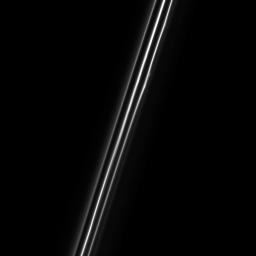
|
F for Fabulous
- Click the image above for a larger view
- Full-Res JPEG (1020 x 1020) (26.9 kB)
- Full-Res TIFF (1020 x 1020) (286.5 kB)
Caption:
When seen up close, the F ring of Saturn resolves into multiple dusty strands. This Cassini view shows three bright strands and a very faint fourth strand off to the right.
The central strand is the core of the F ring. The other strands are not independent at all, but are actually sections of long spirals of material that wrap around Saturn. The material in the spirals was likely knocked out from the F ring's core during interactions with a small moon. To read more about the spiral, see PIA07717 .
This view looks toward the unilluminated side of the rings from about 38 degrees above the ring plane. The image was taken in visible light with the Cassini spacecraft narrow-angle camera on Dec. 18, 2016.
The view was acquired at a distance of approximately 122,000 miles (197,000 kilometers) from Saturn and at a Sun-Ring-spacecraft, or phase, angle of 47 degrees. Image scale is 0.7 miles (1.2 kilometers) per pixel.
Background Info:
The Cassini mission is a cooperative project of NASA, ESA (the European Space Agency) and the Italian Space Agency. The Jet Propulsion Laboratory, a division of the California Institute of Technology in Pasadena, manages the mission for NASA's Science Mission Directorate, Washington. The Cassini orbiter and its two onboard cameras were designed, developed and assembled at JPL. The imaging operations center is based at the Space Science Institute in Boulder, Colorado.
For more information about the Cassini-Huygens mission visit http://saturn.jpl.nasa.gov and http://www.nasa.gov/cassini . The Cassini imaging team homepage is at http://ciclops.org .
Cataloging Keywords:
| Name | Value | Additional Values |
|---|---|---|
| Target | Saturn Rings | F Ring, Saturn |
| System | Saturn | |
| Target Type | Ring | Planet, Satellite |
| Mission | Cassini-Huygens | |
| Instrument Host | Cassini Orbiter | |
| Host Type | Orbiter | |
| Instrument | Imaging Science Subsystem (ISS) | |
| Detector | Narrow Angle Camera | |
| Extra Keywords | Dust, Grayscale, Visual | |
| Acquisition Date | ||
| Release Date | 2017-02-13 | |
| Date in Caption | 2016-12-18 | |
| Image Credit | NASA/JPL-Caltech/Space Science Institute | |
| Source | photojournal.jpl.nasa.gov/catalog/PIA20519 | |
| Identifier | PIA20519 | |
